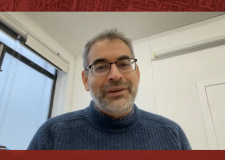Health chiefs urge better care for Brighton and Hove’s dementia sufferers
Doctors and carers are being told to get better at spotting the signs of dementia in people in Brighton and Hove.
And to stop using the chemical cosh of antipsychotic drugs as a way of controlling dementia sufferers’ behaviour.
An official report said that earlier diagnoses would give them better care, a better quality of life and save taxpayers’ money in the long run.
The report was presented to council and health chiefs yesterday (Monday 20 February) at Hove Town Hall.
It said: “There are approximately 3,000 people in Brighton and Hove with dementia.
“Within Brighton and Hove we are expecting an increase of dementia prevalence of about 30 per cent by 2030.
“Only 32 per cent of people in Brighton and Hove with dementia are identified as having a formal diagnosis.
“This is in the bottom 20 per cent in the country in terms of diagnosis rates and therefore is a priority area for development.
“Lack of diagnosis is a key factor that prevents people seeking the treatment they need and being offered support early enough.”
The report said that evidence pointed to significant benefits if people are supported from an early stage after the signs of dementia start to show.
The benefits included
- the improved wellbeing of people with dementia – and their carers
- less likelihood of crises
- less need for costly intensive help such as hospital admission
- a delayed need for residential and nursing care
The report was presented to the Joint Commissioning Board, made up of representatives of Brighton and Hove City Council and Brighton and Hove City Teaching Primary Care Trust.
The report, presented by Anne Foster, locality and transformation programme manager, contained the board’s Joint Dementia Plan and said: “Improving the rate of diagnosis is the cornerstone of the Joint Dementia Plan.”
It also said that hospitals and care homes had to get better at looking after dementia sufferers.
And doctors and care home staff should rely less on the “chemical cosh” of antipsychotic drugs to deal with the sometimes challenging behaviour of people suffering from dementia.
The drugs sedated patients but could be harming them, causing strokes and premature deaths.
The report said: “There has been increasing national concern about the over-prescribing of antipsychotic drugs to deal with the behavioural and psychological symptoms of dementia.
“The evidence suggests that these drugs have limited positive effects in treating these symptoms for 70 per cent of patients but can cause significant harm including increased mortality and stroke.
“The 2012-13 NHS Operating Framework identifies a target of a two thirds reduction in antipsychotic prescribing.”
GP surgeries across Brighton and Hove have been audited twice in the past three years as part of a drive to cut inappropriate prescribing of sedative drugs for dementia patients.
Health chiefs said that they would pay to help teach doctors how to come up with better ways of caring for these patients.
Similar work is under way at the Royal Sussex County Hospital and within the Sussex Partnership Foundation Trust.
At the Royal Sussex, the report said: “This programme of work has included an audit of anti-psychotic medication to people with dementia in the acute hospital with a view to ensure this is done only when necessary and with frequent medical review of safety.”
A dementia specialist is being funded to work at the hospital for a year from April to help educate clinical staff.
One of the challenges identified in the report was to ensure that dementia patients are fed properly in future.
Brighton and Sussex University Hospitals NHS Trust, which runs the Royal Sussex, has invited an expert on the subject to address its Nursing and Midwifery Conference on Monday 21 May.
He is Peter Ashley, who worked with the National Institute for Clinical Excellence (NICE) to develop dementia guidelines and who has had dementia diagnosed himself.
The report said that the total cost of caring for older people with mental health needs in Brighton and Hove was estimated to be £21 million a year.
Dementia sufferers were cared for in hospital, by mental health services, in residential homes and nursing homes, the report said. Many were looked after by relatives.
The report suggested that the Royal Sussex rarely knew how many of its patients were dementia sufferers and that this often led to slower recoveries and longer stays than necessary.
This problem was probably costing the hospital £6 million to £8 million a year – more than was spent on specialist care homes locally.
The report said that more than a thousand dementia patients who had had the condition diagnosed – and more who hadn’t – were admitted to the Royal Sussex in the most recent financial year.
And in one snapshot survey the hospital found that 44 per cent of patients on medical wards had a diagnosis of dementia.
The Joint Commissioning Board was told that money earmarked by the South East Coast Strategic Health Authority to tackle dementia had been withdrawn as part of the recent public spending cuts.
Brighton and Hove’s health chiefs have now set aside money to improve care and treatment for dementia patients but the changes will be slower than planned.
At one point during the presentation of the report, as the obstacles were explained, Denise D’Souza told colleagues: “I sense the frustration in the room.”
The Joint Commissioning Board approved the Brighton and Hove Joint Dementia Plan in principle.
It also asked for financial details to be provided about one aspect of the plan – the Memory Assessment Service – at the board’s next meeting on Monday 23 April.





















